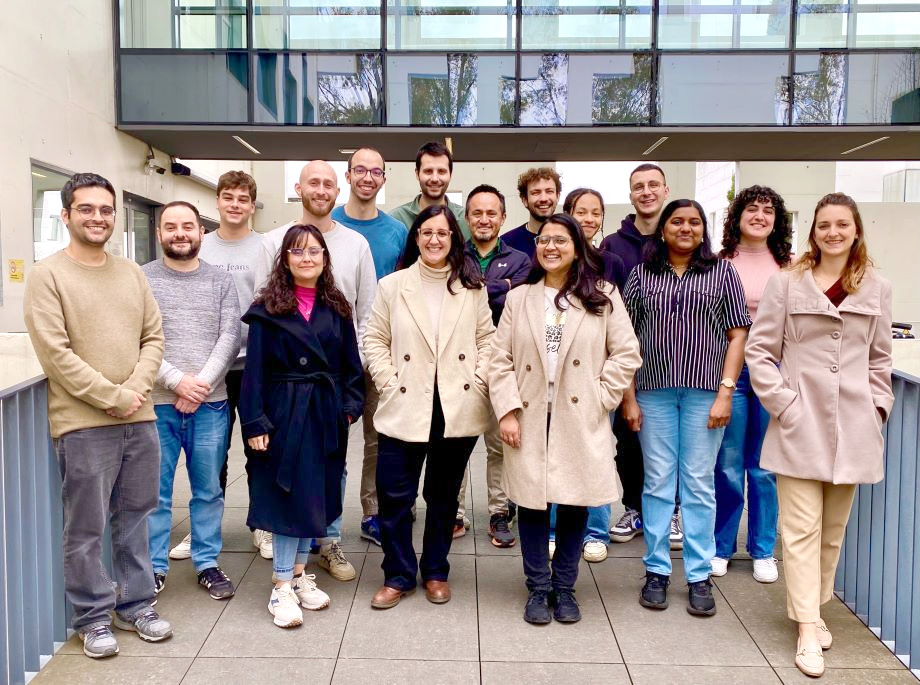NanoElectrocatalysis and Sustainable Chemistry
Group Leader: María Escudero Escribano

Main Research Lines
-
Electrocatalysis for renewable energy conversion (e.g. green hydrogen production and fuel cells)
-
Electrochemical reduction of carbon dioxide into renewable fuels and chemicals
-
Electrochemical activation and partial oxidation of methane
-
Sustainable electrosynthesis of value-added chemicals
-
Surface nanostructuring and atomic ensemble control
-
Multimetallic and multifunctional nanomaterials
-
Elucidating molecular mechanisms with spectroelectrochemistry and electrochemical mass spectrometry
-
Visualising active sites at the atomic level with electrochemical scanning probe microscopy
Our group combines electrochemistry, materials engineering and in-situ spectroscopic and microscopic characterisation to elucidate design principles for the discovery and development of novel electrocatalysts for renewable energy conversion, as well as the production of sustainable fuels and chemicals.
Electrocatalysis plays a key role in renewable energy conversion and storage technologies. Discovering and developing new materials that are active, stable, and selective catalysts remains a grand challenge for many important electrocatalytic reactions. Our research aims to address this challenge by investigating the structure of the catalytically active sites at the atomic level, developing advanced electrocatalyst nanomaterials, and gaining mechanistic understanding of relevant energy conversion reactions.
Some of our main research lines are focused on:
Electrocatalysis for renewable hydrogen production and fuel cell applications
Water electrolysis coupled with renewable energy sources allows direct conversion of clean electricity into chemical energy in the form of hydrogen molecules. Our group investigates novel electrocatalysts for the oxygen evolution reaction, a key reaction that determines the energy efficiency of water electrolysers.
Fuel cells convert the chemical energy from hydrogen or liquid fuels directly into electricity. Our research in oxygen reduction has led to significant breakthroughs such as the discovery of novel electrocatalysts. We also investigate new catalyst materials for the oxidation of liquid fuels such as formic acid.
Electrochemical reduction of carbon dioxide into renewable fuels and chemicals
The use of renewable electricity to convert greenhouse gasses such as CO2 into clean fuels and chemicals is very appealing. We are interested in engineering the structure of the electrode material at the atomic level as well as the electrolyte composition to understand and tune the structure-activity-selectivity relations for CO2 electrocatalysis. Our goal is to rationally design highly efficient electrocatalysts for CO2 reduction into renewable fuels and chemicals.
Electrochemical activation and partial oxidation of methane
Electrochemical methane activation and direct conversion to methanol is highly attractive – a dream reaction that would convert a greenhouse gas into a valuable liquid fuel in a dream device, on-site, and powered by renewable electricity. However, sustainable C-H activation and direct methane to methanol conversion at ambient conditions remain as great fundamental challenges. Within the ERC Consolidator Grant ATOMISTIC, we aim to elucidate the design principles and unveil the structure-reactivity-selectivity relations and the reaction mechanisms as well as the atomic-scale structure of the catalyst materials.
In situ and operando spectroscopic and microscopic characterisation of nanomaterials
Understanding, visualising, and engineering the active sites under reaction conditions is essential to design active, stable and selective catalysts. We combine electrochemical methods with in-situ vibrational spectroscopy such as Raman and transform infrared spectroscopy, online mass spectrometry, gas chromatography, in situ scanning probe microscopy and in situ/operando synchrotron-based X-ray studies. In situ investigations are key to elucidate the design principles and unveil the structure-property relations and reaction mechanisms as well as the atomic-scale structure of the electrocatalyst materials.
Group Leader

María Escudero Escribano
ICREA Research Professor
ICREA Research Professor María Escudero Escribano was born in Cáceres (Spain) in 1983. She graduated in Chemical Engineering from the University of Extremadura and obtained her PhD in Chemistry from the Autonomous University of Madrid in 2011. She carried out her postdoctoral research at the Technical University of Denmark (2012-2015) and Stanford University (2015-2017). In 2017, María joined the University of Copenhagen as a Tenure-track Assistant Professor and Group Leader and was promoted to Associate Professor with tenure in 2021. She joined ICN2 as an ICREA Research Professor in September 2022.

